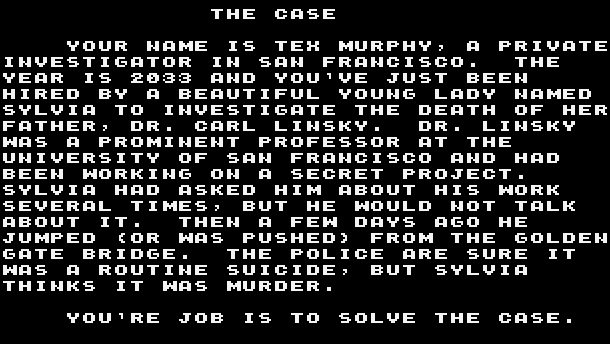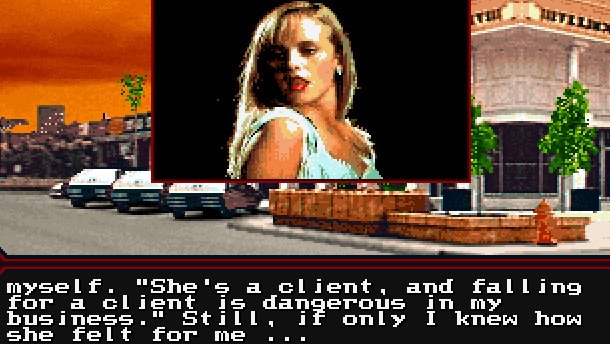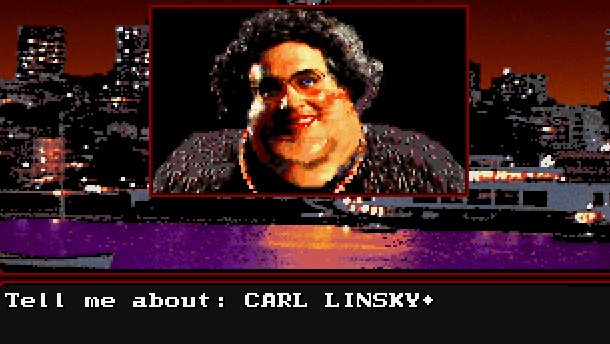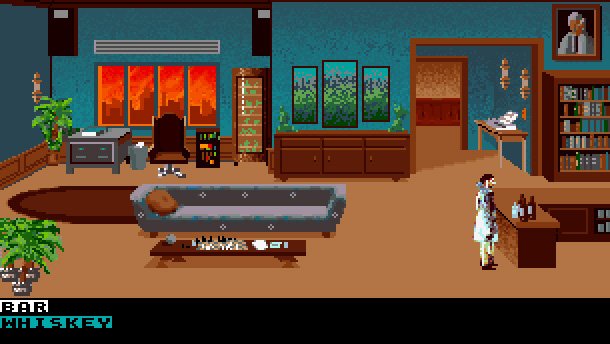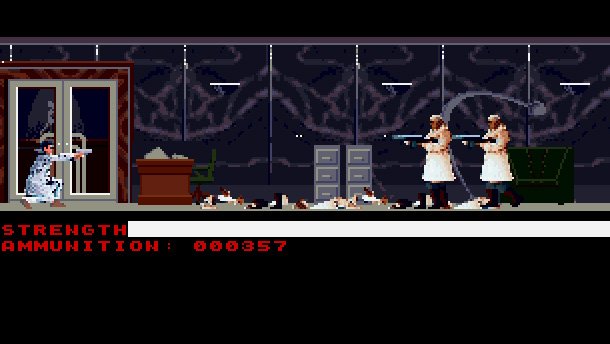Mean Streets was where the Tex Murphy games began, but thank god they got better
We're rerunning Richard Cobbett's classic Crapshoot column, in which he rolled the dice and took a chance on obscure games—both good and bad.
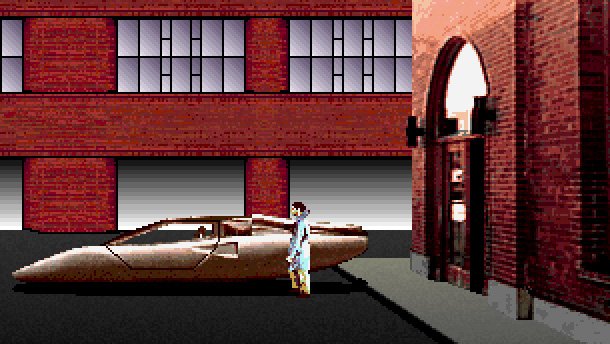
From 2010 to 2014 Richard Cobbett wrote Crapshoot, a column about rolling the dice to bring random games back into the light. This week, how many Mean Streets must a man walk down? In Tex Murphy's case... none. He has a flying car.
The Tex Murphy series hasn't... uh... done well in PC Gamer over the years, but never mind. I love these games. 3D worlds to explore. Quirky FMV characters. And above all, Chris Jones as Tex Murphy himself: a 1940s PI about a hundred years out of his time, still rocking the fedora and trenchcoat look in a mutated, radiation-filled San Francisco, living case to case despite regularly saving the whole world.

That's only the series as of the third game though, Under a Killing Moon. Before that came a pair of 2D adventures, this one and its sequel, Martian Memorandum. Martian Memorandum is fairly traditional and deeply crap. Mean Streets, though? Only halfway there. See if you can guess which half.
If you're aware of most of the non-golf games that Access Software put out, the answer shouldn't be a surprise. Access was a weird company, really. It produced prototype interactive movies back in the days of floppy disks, had a technology that could make speech and proper music with the PC speaker, and its games always had a unique feel to them. Unfortunately, those games included the likes of Crime Wave, Amazon, and worse, and its attempts to 'do' Hollywood were... well, this clip should cover it. That's not even Amazon's low point, terrifying as that sounds.
It wasn't that Access didn't try to make interesting games. It just had odd ideas about what was important, or indeed, sane. Under a Killing Moon had a genuinely revolutionary 3D interface for poking and prodding around the world, but it was sold as an interactive movie—an interactive movie where only one character could move on screen at once, with an irrelevant cameo from Margot "Lois Lane" Kidder as a bartender that was treated as a starring role.
Even at a time when interactive movies did that as standard (especially ones from Take Two, who pulled it twice with Dennis Hopper), that was taking the piss with a catheter. Access games also had a somewhat... ah... loose grip on intellectual property issues, happily pinching things like Pink Floyd for Crime Wave's title screen. And Mean Streets?
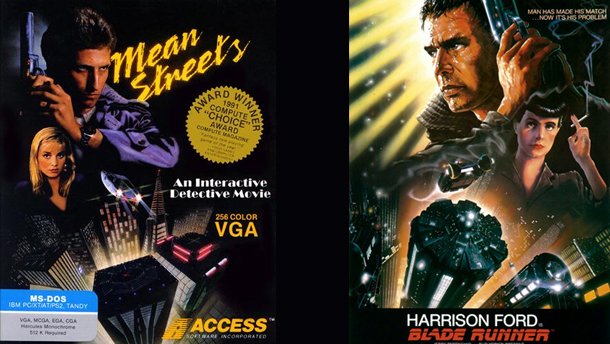
Of course, this was a long time ago, when nobody paid much attention. It's not like, say, Tesla Effect would blatantly rip off the Sherlock Holmes credits or anything. That would be ridiculous!
Keep up to date with the most important stories and the best deals, as picked by the PC Gamer team.
Anyway. After Under a Killing Moon, Access hired a real director and got serious about the interactive movie thing, resulting in one of my favourite adventures ever: The Pandora Directive. It's wonderful, and while its whole Roswell focus feels a lot cornier and more played-out now than it did during the height of X-Files and interactive-movie mania, it's still totally worth checking out.
After that though, corporate spoilsports arrived. There was another Tex Murphy game, Overseer, which was... OK. It was made in a bit of a hurry due to a collaboration with Intel, and ended on a cliffhanger that was never to be resolved due to Microsoft buying Access for its golf games.
Technically, it was continued in the form of Tex Murphy Radio Theater, a short audio-only web series. It too ended on a cliffhanger though, as well as telling a story probably best described as 'absolute balls'. Past lives. Fabergé eggs. The Romanov family. Balls, balls, balls. Truly, things got worser.
Overseer's most notable feature was that it wasn't really a new story, but a retelling of Mean Streets with FMV and much better storytelling—a way to see how Tex's career finished, without having to actually play a game that hadn't simply grown old, but grown barnacles. This though was how the saga really started... and yes, it's exactly as odd as Access's reputation demanded.
There's little ceremony to kick things off with, just a bit of music and a text screen covering the absolute basics: you're Tex Murphy, PI, you've been hired by a beautiful young lady named Sylvia to investigate the death of her father, Dr. Carl Linksky, and the police think it's suicide.
That's all you have to go on, unless you count the piece of psychic paper that came with the game and listed both the villains behind his murder and in fact the name of their evil plan, OVERLORD. Also, the very first screen features the typo "YOU'RE JOB IS TO SOLVE THE CASE", which isn't the best of starts really. For mentioning this, I am aware that I am now destined to type something equally silly within the next five seconds.
Boring intro aside, you know this is an Access game when you hit a key to start, and instead of finding you'reself on the titular Mean Streets, you start several hundred meters above them.

Yes, Access coded a flight simulator for this game. Not a complicated one by any stretch, but still a full flight sim that includes the ability to fly past the Golden— sorry, no, the Pink Gate Bridge. What makes this even more pointless is that while you can do this, in practice you get everywhere by typing in four-digit nav codes and letting the auto-pilot do all the work. So, good use of dev time there.
That said, I think my favourite thing about this is that Tex's futuristic speeder has a fax machine in it. That shouldn't be funny, and he had a fax even after everyone had the internet, but it amuses me. Incidentally, should they actually come back before 2040 or so, I definitely want one of the ones that croaks "YOU HAVE A FAX!" I'll put it next to my food pills and videophone and jetpack.
Tex isn't exactly an amazing investigator here. Receiving a fax about Linsky: The Challenge of Golf dying for his project, the obvious first step would seem to be his office. A simple text screen pops up to say that he picked the lock, poked around, and found... nothing. That's Access for you. Code an entire flight simulator, don't bother drawing the office where the murder mystery victim worked.
It's a rare designer that'll ignore the chance for a pretty girl though, so Sylvia Linsky's house leads to more success. "She wore a pale blue blouse and white shorts that were short enough to be friendly," Tex declares, having yet to develop much wit. "I knew I was starting to fall for her."
Tex apparently doesn't get out much at this point in his career. More creepily, Sylvia is introduced licking her teeth in a way that could mean 'dangerous seductress' or 'one second, I have a bit of lettuce stuck here'. She's also not very good at the whole femme fatale thing, like she's actually asking about her dead father. Tssk. That is not how this genre works!
She does earn a few precious untrustworthiness points when pressing for details about dear departed dad produces the response "He was happy, then he took a leave of absence to do some consulting work and his whole personality changed. I'm sure he was in some sort of trouble. Because of this, I don't believe he committed suicide! I've lost both my father and the insurance money, and I am going to find out why."
So. To recap. "My father's personality changed and then he did something out of character, which is actually closer to sounding like a suicide than a murder if you think about it, but INSURANCE! INSURANCE! ONE MEEELION DOLLARS INSURANCE! I WANT IT I WANT IT!"
If I didn't already know the plot of this game, I'd be more than a little suspicious at this point. But then, maybe one meeelion dollars just isn't worth that much any more. She is paying Tex $10,000 just to investigate this, having met him before he started charging just $500 a day plus expenses. A text parser offers the ability to drill her in a way other than the one Tex wants, but only very carefully. Asking about CARL LINSKY, her beloved, murdered father, is fine. Simply ask about CARL though, and she's all "Carl? Carl? No idea who you mean. Why are you bringing up this stranger I have never heard of?"
After a question, it's also possible to bribe or threaten for more information. Bribing her with her own money seems a bit pointless. But maybe a threat is in order—some kind of noir-savvy "Sister, I know this dance, so how about we skip to the end of this pretty but time-wasting inanity and you spill enough beans for a whole village to fart their way from here to Christmas?"
I try this. She takes it as well as you'd expect.

Oh, if only more people had done that to Cole Phelps.
Visiting the other people on the initial hit list, a few facts quickly come to light—Linsky's corpse has a strange injury on the neck, perhaps from a hypodermic needle, nobody seems to know what project he was working on, and whoever programmed the goddamn autopilot on Tex's speeder shouldn't even be allowed to repair tills for McDonalds. Oh, for a simple map screen, that's all I'm saying.
Also, this is Carl's fiancée, Delores Lightbody. Tex initially suspects that she might have offed him for the insurance, but she soon squashes that concern much as she must have regularly squashed poor Carl.
It's also possible to threaten her, but that doesn't work out so well. Tex calls her a sack of lard and she gives him a right hook right to the face. With, it must be said, cause. In fact, Tex's attempts to be a tough guy rarely work out. It's possible to try it on a cop, on a medical examiner, and anyone else, though people are apparently used to this and allow Tex back in to have another go at the conversation right afterwards with no hard feelings or even acknowledgement of the beating.
Investigation can't all be talking to people and getting concussive vasectomies, though. Sometimes, a detective has to break into a place and have a proper poke around. It's not clear what you're looking for to begin with, but the answer turns out to be keycards—coloured keycards, each with a chess-themed password. Most of the game boils down to getting the navigation codes to people and rooms, then heading over and yoinking what you need from them without tripping security systems.
It's a very tedious kind of investigation though, thanks to Tex walking at the speed of an accident-prone snail that likes to sniff glue. It's tough to find important bits and pieces, and impossible to know if you've missed anything. On the plus side, this is a rare case of an adventure that expects you to keep notes and make connections for yourself. The plot comes in bursts when arriving at locations and other key moments, but figuring out who to speak to and about what is all down to you—and there's no shortage of locations and people to gather clues from. Some are good, some are bad, some are mutants, and one is called "Lola Lovetoy". Christ.
Tex's only friends are his street contact Lee and his secretary Vanessa, the first of whom will offer help in exchange for cash, while the second works for Tex Murphy and so has probably forgotten what cash even looks like. Both do however have voice samples, which was seriously impressive for a game released in 1989, even if they deliver their actual information via fax.
Also, sometimes people try to kill you by making you play the most appalling side-scrolling action game this side of Rise of the Dragon. Also with bullets. But the minigame is by far their cruelest weapon.
It's so bad. It's not about killing the enemies, though that helps, but getting through the army of them on each stage to reach the exit. Tex can only take a couple of hits and walks incredibly slowly, though does at least have plenty of ammunition for his gun... which makes people collapse into shards for some reason. Equally mysteriously, it can only hit ranged targets if Tex stands up, shooting at little more than melee range while he's crouched and avoiding incoming fire. Never buy guns from Neo-Poundland.
What emerges from all of this investigation is that a local industrialist called J. Saint Gideon has created a brain-control technology called OVERLORD, named on the grounds that it's the scariest name he could think of, and plans to use it to make important people do his bidding via an evil satellite in orbit. In case you were wondering about the similar name, it's also called that in the remake, Overseer, but the game had to be called something else for legal reasons. Another early name, co-writer Aaron Connors' suggestion "The Poisoned Pawn", also got the kibosh after being misheard as "The Poisoned Pond".
What? No, that's not a joke. This is a thing that apparently happened.
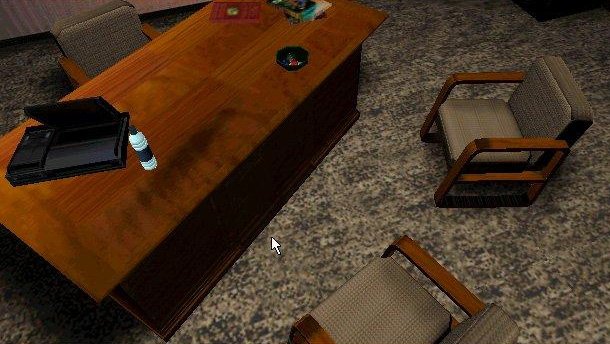
Overseer was a much better take on the story, not least because it had fewer puzzles where you literally fly up to someone and just say "Give me your passcode" and they're just "Sure, here you go." Specifically, it has zero of those puzzles, whereas Mean Streets has one and a half—the half provided by Tex finally meeting someone he can intimidate.
Overseer went to a lot of trouble to establish Gideon as a proper antihero, played excellently by Michael York—a guy who even in defeat, Tex can't help but think might, just maybe, have been OK. His final scene is especially good, well-performed on both sides, and one of gaming's most noble send-offs.
Mean Streets? Not... not so much. In this version, Gideon is just your average Bond villain-type foe, begging Tex not to destroy his life's work as he punches in the self-destruct codes. Obviously, that doesn't work, Tex types in the password "whydidibuildthisintomydesignanyway53" and soon enough the satellite Gideon intended to use to to mind-control politicians and the like goes boom-boom. So far, so generic. But this is an Access game. See if you can spot the problem.
"Bob, Sylvia was a brunette, wasn't she?"
"Oh, it's not like they'll remember two whole seconds ago."
Ah, Access. I'd say 'never change', but that would be pointless since you've been dead for about a decade. Also, when you changed, you produced The Pandora Directive, so... well... thanks for changing!
As said, a decade later the Mean Streets story was modernised and remade in the form of Overseer, and before anyone complains about spoilers, I point you to the fact that the trailer flat out gives away that Gideon is responsible and more or less exactly what Overlord is—not that it's a huge shock. Many of the details were changed though, with the writing going up so many levels that it starts to feel like the Tower of Babel was actually created just to provide it with sufficient steps.
If you're going to check this game out in some form, make it that one. Definitely play The Pandora Directive first, though. Hopefully Tesla Effect will blow it out of the water [Richard reviewed The Tesla Effect when it came out, and I'm afraid to say The Pandora Directive remained wet. — Ed] but for now, it's hands-down Tex's best adventure, and a spin on the genre it genuinely saddens me so few others even tried.
Even so, I can't believe that it's 2013 and I'm looking forward to an FMV-based interactive movie.
I guess, like fax machines, some technologies simply refuse to die.
Disclosure: I backed the Project Fedora Kickstarter at the $30 level to support a new Tex game, but have had no input on it of any kind, including user forums and Kickstarter comments. I am however looking forward to adding the soundtrack to my Music To Open a Detective Agency By playlist.
